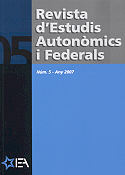Nuevos Estatutos de Autonomía con viejos sistemas electorales
Article Sidebar

Main Article Content
Miguel Ángel Presno Linera
The purpose of this paper is to analyse the effect of the recent reforms of the Autonomous Statutes on the electoral system of the Autonomous Communities, based on the material rules (gender equality, electoral debates, etc.) and procedural rules (a qualified majority to approve the electoral bill) which they included. The new Autonomous Statutes display a twofold mistrust. First, there is mistrust of the Central Parliament and its General Electoral Bill, due to its heavy regulation of regional elections. Second, there is mistrust of the Parliament of the Autonomous Community, which is restricted in two ways: a) by including the subjects that should be in an electoral bill in the Autonomous Statute; b) by means of the “consensus trap”, which requires a high level of agreement among Parliamentary groups in order to pass the electoral bill, which in all likelihood will prevent the changes from being made, as the political and institutional future of the groups involved is at stake. If we add two further factors (the application of 116 articles the General Electoral Bill to the autonomous elections and the Autonomous Statute regulation on electoral matters), and we discount one factor (the lack of innovation in the autonomous regional system), it is clear that the Electoral Bills of the Autonomous Communities will be redundant, too detailed and will cover too little. In conclusion, we have new Autonomous Statutes but old electoral systems.
Article Details
How to Cite
Presno Linera, Miguel Ángel. “Nuevos Estatutos de Autonomía con viejos sistemas electorales”. Revista d’estudis autonòmics i federals, no. 5, pp. 101-45, https://raco.cat/index.php/REAF/article/view/252542.